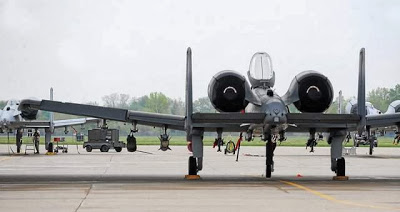A little more than a year after Macomb County and regional leaders beat
back an attempt to substantially cut the number of A-10 aircraft
stationed at Selfridge Air National Guard Base, the Air Force is again
gunning for the odd-looking planes known as “Warthogs” – this time
pushing to eliminate the entire U.S. fleet.
The Air Force hopes to retire all 326 A-10 Thunderbolts, including the 18 planes stationed at the Harrison Township base.
The $523 billion defense budget bill that passed the
Senate last Friday and heads to the president for his signature freezes the
A-10 Thunderbolt II deployments in place for fiscal year 2014. But the
Air Force chief of staff has made it clear he believes the planes, which
provide low-altitude firepower to support Army ground troops, are
obsolete.
With the Pentagon facing increasing pressures to reduce their budget,
Chief of Staff Gen. Mark Welsh has said ther aircraft such as the F-16
jet fighter and the long-awaited F-35 aircraft could provide all support
for ground troops and also perform other missions. The A-10 is
considered a one-dimensional weapon.
“We’ve delayed this until they have a plan in place that’s credible, and
they haven’t done that yet,” said Sen. Carl Levin, the Michigan
Democrat who chairs the Senate Armed Services Committee and is co-author
of the defense authorization legislation.
The 107th Fighter Squadron at Selfridge consists of 455 Guardsmen who
are A-10 pilots or engage in maintenance and operations. The unit is
also comprised of 180 full time employees — 21 serve on active-duty
status and the remainder are uniformed civilian technicians.
The squadron’s latest deployment overseas was in fall and winter of 2011
when the unit spent four months stationed in Kandahar, Afghanistan.
“I can’t speculate on the future of the mission,” said Penny Carroll, a
Selfridge spokeswoman. “We are following closely the (2014) defense
bill, hoping it stays intact.”
In addition to the Air National Guard squadron, Selfridge is also home
to other national security agencies, such as the Coast Guard and a
high-tech Department of Homeland Security facility that works with local
law enforcement agencies.
But Levin conceded that the loss of aircraft would be a “big hit” for
the sprawling base – the largest military installation in Michigan.
An effort would be made to find “substitute” aircraft if the A-10s are
retired, Levin added, “but we’re trying to make sure that doesn’t
happen.”
The attempt to eliminate the nation’s A-10 fleet at a savings of $3.7
billion annually has already drawn a sharp response from more than 30
U.S. senators and representatives who sent Defense Secretary Chuck Hagel
a detailed letter objecting to the preliminary plans.
“We oppose any effort that would divest the A-10, creating a CAS (close
air support) capability gap that would reduce Air Force combat power and
unnecessarily endanger our service members in future conflicts,” the
members of Congress wrote.
The Warthog, a “tank buster” aircraft, is designed to fly low and slow
over an open battlefield. For decades, the Air Force has attempted to
scrap the A-10 while the Army has praised its ability to protect troops
with bombs and rotary machine guns.
According to Agence France-Presse, Welsh said last month “if we have
platforms that can do multiple missions well and maybe not do one as
well as another airplane, the airplane that is limited to a specific
type of mission area becomes the one most at risk. You only gain major
savings if you cut an entire fleet.”
Welsh’s counterpart in the Army, Gen. Ray Odierno, testified before the
Senate Armed Services Committee in November and said: “The A-10 is the
best close air support platform we have today. It’s performed incredibly
well in Iraq and Afghanistan.”
When the military brass in 2012 attempted to put the 107th Fighter
Squadron at Selfridge and their 24 A-10s on the chopping block, the
proposal united Macomb County’s elected officials and business community
to oppose the plan. The Selfridge Base Community Council coordinated a
lobbying campaign and Gov. Rick Snyder, Oakland County Prosecutor L.
Brooks Patterson and Detroit Mayor Dave Bing joined the cause.
Because the proposed cuts in A-10 aircraft carried such a widespread
national impact, 49 governors and every state’s National Guard adjutant
general united in opposition to the move.
The result was a Pentagon retreat, with military officials agreeing to a
small realignment of the nation’s A-10 fleet that reduced the 107th
from 24 planes to 19. The A-10 contingent at Selfridge now consists of
18 planes.
Critics say Air Force crews assigned to other multi-purpose planes spend
only a portion of their time training for close air support missions,
while the A-10 squadrons have a singular focus. Relying upon the
Warthog’s maneuverability and the extensive armor that protects the
aircraft, the A-10 can bombard enemy ground forces from as close as 50
meters.
As the A-10s manned by Air National Guard forces have demonstrated far
more cost-efficiency than squadrons flown and maintained by Air Force
active-duty personnel, the bipartisan group of lawmakers took a few
shots in their correspondence to Hagel.
“It would be difficult for DoD (the Department of Defense) to justify
the divestment of the A-10 while the Air Force continues to expend
millions of dollars on conferences, air shows, and bloated headquarters
staffs, while also struggling to meet statutory audit deadlines,” they
wrote.
Congressional advocates say recent funding increases to modernize the
A-10s would be undermined and essentially wasted by idling the entire
fleet. They also charged that the Air Force’s apparent acceleration of
an A-10 divestment is “short-sighted and primarily budget-driven,”
without regard to the impact on future battlefields.
“Many soldiers and Marines are alive today because of the unique
capabilities of the A-10, as well as the focused close air support
training and dedicated close air support culture of A-10 pilots,” the
letter said.
U.S. Rep Candice Miller, a Harrison Township Republican, co-signed the
letter but Levin and his brother, Rep. Sander Levin, did not. On
Wednesday, Sander Levin said: “We understand what’s at stake for
Selfridge. We think it’s a vital resource.”





